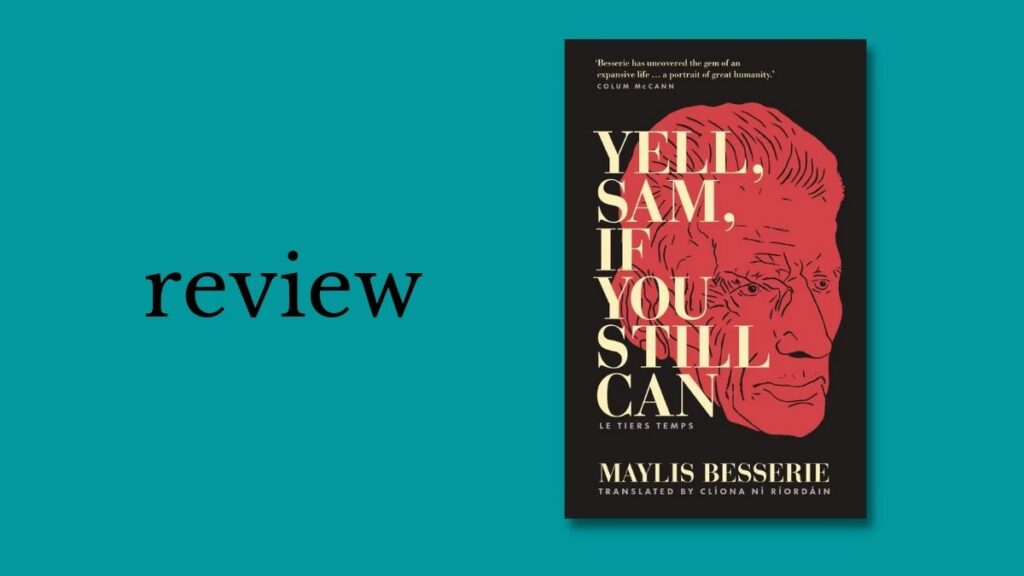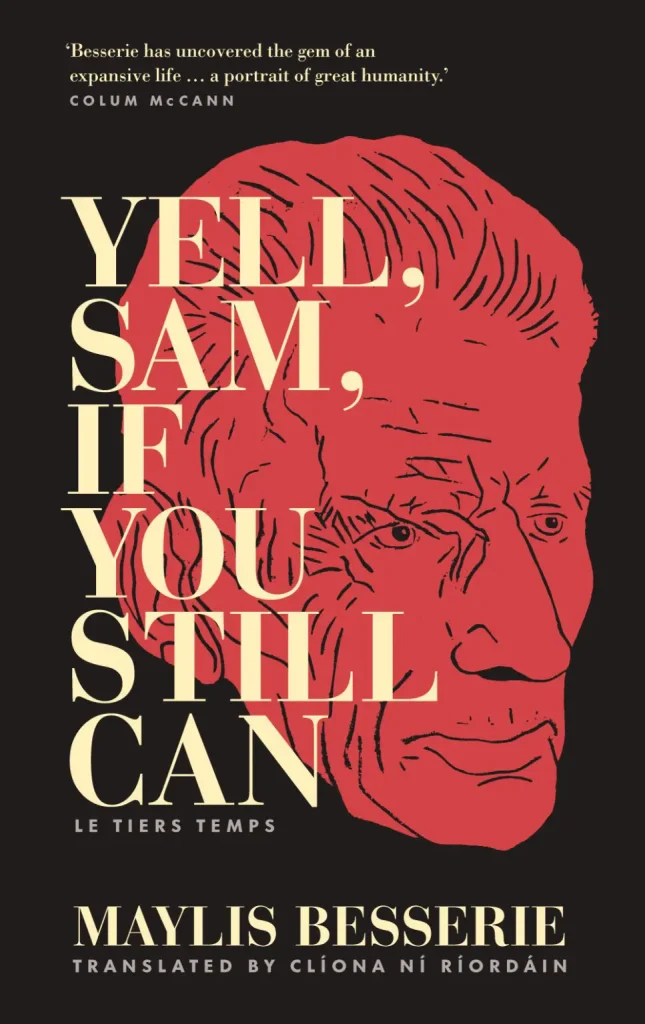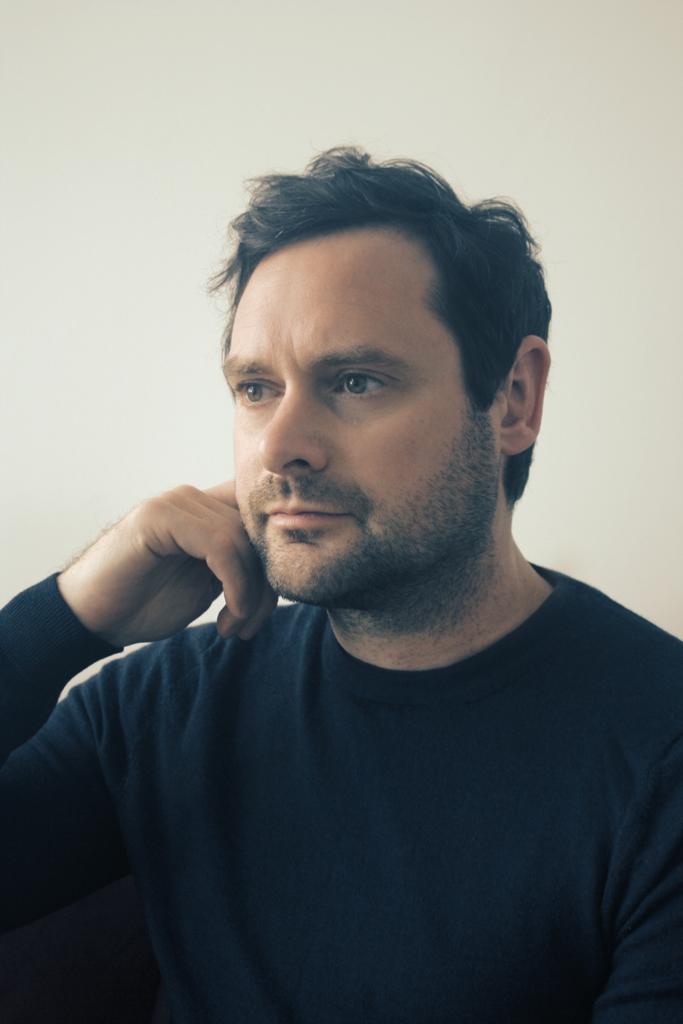
Yell, Sam, If You Still Can|Maylis Besserie|trans. by Clíona Ní Ríordáin|Lilliput Press|€15
Eoghan Smith reviews Yell, Sam, If You Still Can, by Maylis Besserie (Lilliput Press)
“There is no doubt that the task Besserie has set herself – to convincingly imagine the death-bound privacies of one the twentieth century’s greatest writers – is from an artistic point of view both admirable and fraught with peril.”
by Eoghan Smith
Yell, Sam, If You Still Can is the English language translation of French author Maylis Besserie’s debut novel Le Tiers Temps, for which she won the 2020 prix Goncourt du premier roman.
This short, evocative work is a fictionalised account of the last months of Samuel Beckett’s demise in Le Tiers-Temps retirement home in Paris between August and December 1989.
Primarily narrated in the first person, the text is a tissue of contemplations and memories, occasionally interspersed with the voices of and written reports by the various medics and careworkers who are monitoring the ailing Beckett.
Life in fiction
This is not the first time Beckett’s life has been the subject matter of fiction. Besserie’s book immediately recalls Jo Baker’s excellent A Country Road, A Tree (2016).
In her book, Baker, wisely, focuses on Beckett’s work during World War Two with the French Resistance in Paris and, later, with the Red Cross in Saint-Lô in Normandy; these were easily the most adventurous years of Beckett’s otherwise comparatively unexciting life.
In spite of its concentration on a particular period, Baker’s novel is expansive in its reconstruction of historical detail. In this sense it has a larger scope than Yell, Sam, If You Still Can, which is an altogether more compressed, more spartan, piece of fiction. Besserie, however, is a writer of interiority.
Although the book documents – without sensationalising – the writer’s physical degeneration, the attention largely falls on the life, or the end of the life, of Beckett’s mind, out of which Besserie generates a pleasing mixture of black humour and occasional lyrical intensity.
Credit here must also go to Clíona Ní Ríordáin, for her adroit translation.
Metafictionality
There is no doubt that the task Besserie has set herself – to convincingly imagine the death-bound privacies of one the twentieth century’s greatest writers – is from an artistic point of view both admirable and fraught with peril.
There is undoubted skill in her writing; her Beckett is a largely acerbic, clear-eyed and contemplative figure. We also discover the metafictionality of Besserie’s approach.
Her intention, we are told in a puzzling postscript that mysteriously states that ‘Samuel Beckett really existed’, was to create a narrative where Beckett is like ‘a character at the end of his life, like those who inhabit his own work’.

This adds a further layer of complexity – how is one to write Beckett as a Beckettian character without falling into mimicry and satire? One senses the edge of the cliff of bad decisions at the tip of the big toe. Mercifully, Besserie avoids this obvious temptation, crafting instead an oddly compelling, colourless mixture of austerity and acidity:
I’m in the garden. I’m not really sure if it can be called a garden, but I’m ‘in the garden’. That’s what they call it here. I’ll use its given name. In the garden, the lawn is made out of green, non-slip plastic. It’s a fake lawn and you walk on it as if it were real, and yet it’s not because you can’t lie down on it. And that’s how I came to be in the garden.
Beckettian aesthetic
There are other challenges. With inevitability, and because this is also essentially the story of a sick, immobile old man waiting to die in a quiet nursing home, not much happens.
Moments of routine dullness, which are integral to the Beckettian aesthetic, are not eschewed but embraced: we see Beckett watching a rugby match in which Ireland lose narrowly to France (of course they do), and then remembering his own inconsequential days on a rugby pitch.
This passage comes with an extended, drama-less transcript of the television commentary. Then there is Beckett at the dentist, which culminates in the writer getting a routine filling (Beckett had tooth problems all his life).
Many of the memories are brief glimpses of the people and places that filled Beckett’s life. We hear, for instance, about Beckett’s cordial relationship with the family of the boy would who become the professional wrestler, André the Giant. Such scenes may test the reader’s enthusiasm:
One day big Dédé broke the seat on the tractor. The black seat made of polyvinyl chloride. It collapsed under the weight of the giant’s frame. Off to the scrapyard. Knocked out. Dédé the colossus couldn’t get into a car. Unless he was bent over and his head was sticking out of the roof that someone had opened so he could get inside.
Echoes and allusions
This is more or less where this strange anecdote ends and we never hear about Dédé again. Yet these scraps of unelevated mundanities are intertwined with memories of several recurrent, spectral figures from Beckett’s life.
James Joyce appears regularly, as does Beckett’s overbearing mother May, and wife Suzanne.
These regular, precise punctuations help to create subtle order in what is often an elliptical narrative and totalises the sense of a much fuller lived existence out of which a body of some of the most significant literature of the last century was created.
The narrative is sprinkled with allusions to Beckett’s works, such as Ill Seen Ill Said, Film, or The Lost Ones. Astute readers will also pick up echoes from the trilogy of Molloy, Malone Dies and The Unnamable, but there are plenty here for Beckett aficionados to spot.
The narrative reverberates with versions of Beckett’s most famous lines, which can, at times, feel a little forced. Beckett, stoically struggling to walk, tells us ‘I fail and try again’. Elsewhere, the phrase ‘nothing doing’ – the botched translation of the opening lines of Waiting for Godot when it was first played in Dublin – is smuggled into a scene about preventing moles from digging holes in a garden.
These intrusions add a certain wryness, though even for Beckettophiles they may ultimately prove a little distracting.
There is also the matter of the unfortunate title, which sounds more like a forgettable Vaudeville comedy than anything suggestive of Beckett’s last days (one cannot imagine Beckett as being a ‘yeller’).
Thresholds
The novel ends just before Beckett’s death. Here the narrative perspective shifts, with a new, third person voice entering the story. We will not be told about the facts of what ensued, for this narrator asks: ‘What’s the point of telling you about what happened at the end? There is nothing to tell’.
Appropriately, the protagonist does not die at the end, for Beckett was much more interested in the continuation of the struggle.
And so we are left with this narrator urging Beckett to carry on, to rage; he has not yet reached, as the Unnamable would say, the threshold of his story. It is on this threshold that we too are left to contemplate this provocative, intriguing, rewarding and audacious act of imagination.

Eoghan Smith is the author of The Failing Heart (Dedalus 2018). His second novel, A Provincial Death is out now with Dedalus.











